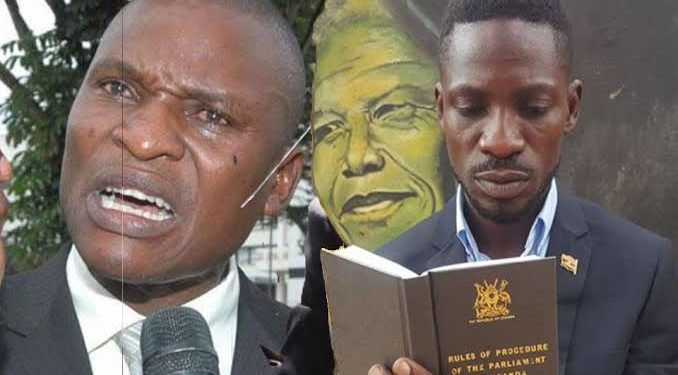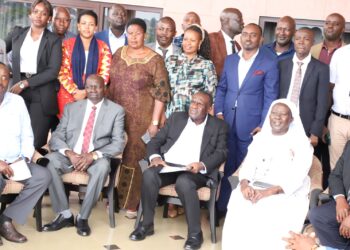In a surprising twist that has left political circles abuzz, the former senior Presidential press secretary Joseph Tamale Mirundi has criticised and mocked the recent leadership shuffle within Bobi Wine’s camp.
The recent decision to replace seasoned politician Mathias Mpuuga with the relatively young and less experienced Joel Ssenyonyi as the Leader of the Opposition has raised eyebrows. This move prompted Mirundi to liken the transition to a scenario where a primary one kid assumes the role of head prefect.
Mpuuga, known for his seasoned political career and extensive experience in legislative matters, held a prominent position within Bobi Wine’s National Unity Platform (NUP) and in his two years as a leader of the Opposition, the LOP office has gained much more respect than in the past. However, his replacement with Ssenyonyi, a former spokesperson for the party and a relatively fresher face in the political landscape, has sparked debates about the reasoning behind such a pivotal change.
Renowned for his outspoken and often controversial opinions on political matters, Mirundi expressed himself freely on his YouTube channel. He did not hold back in mocking and criticizing Bobi Wine’s actions, calling him a benevolent dictator who fears guidance and is feeling insecure about Mpuuga’s successful job performance. Mirundi suggested that Bobi Wine was afraid of losing public support from both the opposition and the supporters of the current government since Mpuuga was showing the country how the opposition could work with the sitting government without shedding blood.
“Bobi Wine may not be the ideal choice to lead our country due to his approach resembling that of a benevolent dictator. It’s akin to appointing a primary one kid as a head prefect. Ssenyonyi’s contributions to this country seem somewhat inexperienced and overly self-assured. There’s a concern that his leadership might lead the party to failure. In Kenya, Moi faced a similar situation when he brought in Uhuru Kenyatta to lead the party, causing many seasoned members to depart from the party. Bobi Wine’s preference for those who unquestioningly agree with him is causing discomfort among respected elders and seniors in his circle,” he said.
Mirundi cautioned Bobi Wine to draw lessons from history, citing an instance when Besigye replaced Winnie Kizza, a seasoned and high-performing leader of the Opposition, with Betty Aol. Unfortunately, Betty’s impact in the office was minimal, and she remained largely inconspicuous even within the Parliament.
This move proved to be a critical mistake that significantly contributed to the downfall of the Forum for Democratic Change (FDC). It serves as a stark reminder of the importance of thoughtful and strategic leadership choices, emphasizing the need to prioritize competence and effectiveness over personal preferences when making such crucial decisions.
“Bobi Wine is panicking because of fear and the moment you start that, failure is on the way. By the way, I’m not saying that Mpuuga would have stayed, but his replacement would have been relative to his levels. Bobi Wine would have looked for the senior members within the party such as Ssegona, Muwanga Kivumbi, and John Baptist Nambeshe,” he said.
The comparison by Mirundi underscores the scepticism surrounding Ssenyonyi’s readiness to navigate the complex and demanding role within the political opposition. Critics and political analysts have also joined the discourse, questioning the strategic implications and potential ramifications of such a transition in a crucial political position.
While Bobi Wine’s camp maintains that this move signifies a new wave of leadership and vision, critics like Mirundi and others continue to raise valid concerns about the qualifications and preparedness of Ssenyonyi to effectively steer the opposition’s parliamentary affairs.
“Bobi Wine wants bootlickers who will not question. How can you get a young kid without any experience to lead experienced men with credible political journeys? Bobi Wine is worse than Museveni.”
As discussions intensify and speculation mounts, the spotlight remains firmly fixed on the unfolding dynamics within Uganda’s political landscape and the implications of this unexpected leadership change initiated by Bobi Wine’s camp.
Do you have a story in your community or an opinion to share with us: Email us at editorial@watchdoguganda.com













